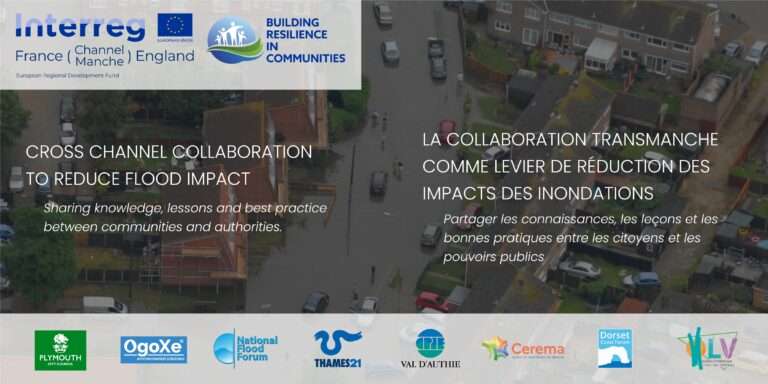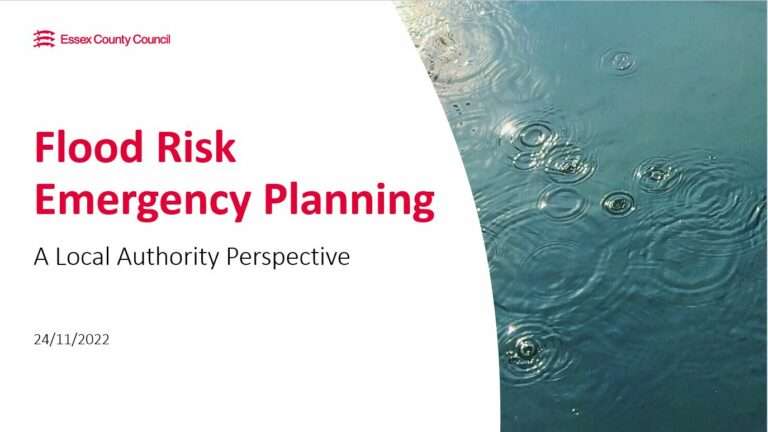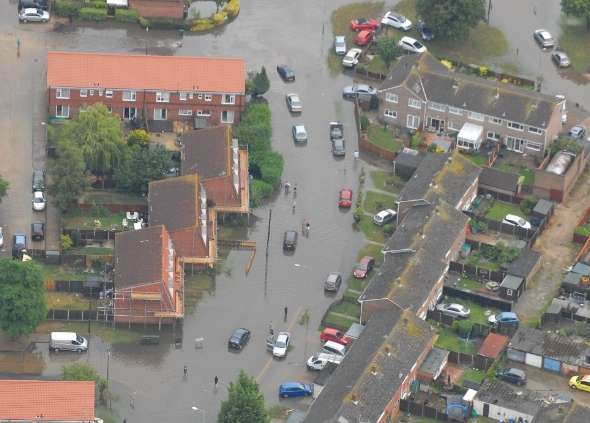BRIC Seminar/Workshop 24th Nov 2022
Cross Channel Collaboration to Reduce Flood Impact online event

This exciting online event aimed to share knowledge, lessons and best practices between communities and authorities from the 8 pilot sites of the BRIC project. The seminar was split into four sessions, with specific objectives for each.
At 9:30am GMT Session One started off with brief introduction by the Masters of Ceremonies for the day, Thames21’s Chris Coode and Oise-les-Vallee’s Imane Fedaili. They detailed the plan for the day, set out clear objectives, and introduced the upcoming speakers. Interpreters Pascal Bardin and Rebecca Richey from the translation service provider Akouo enabled attendees to listen in their preferred language, helping to ensure that cross-border collaboration was achieved.
Our first guest speaker, Councillor Andrew Sheldon from Essex County Council. He gave a presentation providing a background history of Canvey Island, and an overview on the first topic.
“What is the current situation on flood risk management, data collection and emergency planning from the Local Authority perspective?”.
Cllr Sheldon’s presentation highlighted the complexity of issues around flooding on Canvey, and the different stakeholders and their various responsibilities. He emphasised the pressing need for individuals to be proactive, the need for partnership working, and the need for greater public engagement. He also pointed out that terminology really needs to be tailored to an audience, indicating that terms such as ‘1–100-year flood’ mean nothing to people who have been flooded, sometimes repeatedly.

Following on from Cllr Sheldon, Stephen Dickson and Zahida Yousaf from Essex County Council gave a joint presentation on flood risk emergency planning. They detailed the plans of Essex County Council to mitigate flood risk in the future, including the use of SuDS (Sustainable Drainage Systems), other natural flood measures and CaBA (Catchment Based Approach) thinking.
This presentation highlighted the benefits of a catchment approach, and the plethora of benefits that SuDS can offer, including reduced flood risk, improved water quality and biodiversity, and carbon capture. The presentation also detailed some of the current challenges to SuDs installation, including adoption and maintenance of sites, land availability, economic viability, and policy support. Hopefully these challenges will be overcome as the benefits of SuDs prove to outweigh their disadvantages. It was highlighted that emergency response plans are also key, and needed to be closely linked to public engagement as part of a joined-up approach.
This concluded the English-speaking presentations and Chris Coode handed over to Imane Fedaili for introductions to our French Speaking Presenters.
Daniel Melin, Mayor of Noeux Les Auxi, was our first French speaker. He provided some interesting insights into the different working practices currently employed to combat flooding in France. Mayor Melin spoke on the importance of community solidarity, the need for a multi-angled approach, and the need for whole catchment and good partnership working practices. He also highlighted how different responsibilities across a catchment can disadvantage communities in the lower catchments, who have to suffer the consequences of and pay the repair costs of flooding caused by poor upstream management. This demonstrates the merits of a whole catchment approach, which needs to be further developed on both sides of the channel.
Mayor Melin’s presentation highlighted that stakeholders should adopt a whole catchment approach and partnership thinking. Sharing of information and sharing of responsibilities is necessary to provide flood resilience to community.
Our final speaker was Lieutenant Colonel Vincent Folgoas from the French SDS. LC Folgoas provided a detailed overview of the complicated system for reaction and response to flooding events, and the need for reform in this system. He explained that this reform is required to tackle the growing threat of flooding, for flood disadvantaged communities.
LC Folgoas’s presentation highlighted that proactive planning is essential for stakeholders across multiple levels of government down to the community and individual level, as this helps to prepare for slow-onset and sudden-onset flood events. He also highlighted that there is a need for an understanding of responsibilities and for those responsible to be better held to account.
After giving thanks to our speakers and their wonderful contributions, the seminar continued with a brief Q&A session.
Q for Cllr Sheldon: Would a Community Resilience Network be useful?
Yes – every citizen takes some of the responsibility – this has often been lacking. Responsibility needs to be shared
Q for Cllr Sheldon: What advice would you give to leaders in 1960s?
Don’t develop! To government – don’t split up the responsibility in the way it has – flood risk assets and flood risk management assets
Q for Cllr Sheldon: Should it not be a multi-agency approach, not a focus on individuals with the cost of living crisis etc.?
Community responsibility and a multi-agency approach are not mutually exclusive – they can be done in tandem. Cultural and behavioural changes can be done free of charge
Q for Mr Melin: How are the discussions going with the other 8 villages upstream?
There are lots of things which could have been avoided upstream. There is a need to make citizens aware of the impacts that they can have on the downstream flood risk – ‘SLOW THE FLOW’. To create assets, the owners need to agree to the authorities putting in retention basins etc. – there is a need for wide agreement on these assets (farmers etc.)
Q for Mr Folgoas: How do you help families create plans?
All villages face different risks. Family security plans need to be adapted to these risks but also to the general management of the town as it is described in the wider town plan. Families need to know what they can do – measures to implement to make them safe.
The Q&A session highlighted the need for a focus on multi-agency, community, and a catchment-wide approaches across the channel. These approaches need to acknowledge the different responsibilities of each stakeholder and involve collaboration in order to achieve flood resilience.
Click on the link below for part 2/4…..
Project partners


A detailed account of what was a very successful and interesting seminar. I’m looking forward to reading the next instalment.
I was pretty pleased to uncover this website. I wanted to thank you for ones time for this wonderful read!! I definitely savored every part of it and I have you saved as a favorite to see new information on your site.
Wow, wonderful blog structure! How lengthy have you been running a blog for?
You make running a blog look easy. The entire glance of your website
is magnificent, let alone the content material!
Wow, superb weblog structure! How long have you ever been running a blog for?
You make running a blog look easy. The whole glance of your web site is
wonderful, let alone the content!
This piece of writing presents clear idea in favor of the new people of blogging,
that really how to do blogging.
I really like it whenever people get together and share views.
Great blog, stick with it!
I just wanted to express my gratitude for the valuable insights you provide through your blog. Your expertise shines through in every word, and I’m grateful for the opportunity to learn from you.